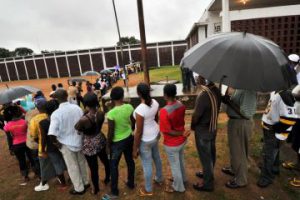In West Point, a shantytown community on the edge of the Atlantic, dozens of people endured long lines and the pouring rain to vote in this country’s second presidential elections since the end of 14 years of civil war.

Frances Roberts, 53, arrived at the polling station at 4 a.m., four hours before voting commenced.
“I wanted to be the first,” she said after casting her ballot for the opposition party Congress for a Democratic Change (CDC). Winston Tubman, the CDC’s Harvard-educated presidential nominee, and George Weah, the famous soccer player running for vice president, have won support among a cross section of Liberians who, like Roberts, say despite President Ellen Johnson Sirleaf’s accomplishments in ridding the country of a heavy debt burden and rebuilding institutions and infrastructure, they don’t earn enough to eat well or send their children to school.
At an African Methodist Episcopalian church in Congotown, on the outskirts of Monrovia, Siah Myumah, 42, said the money she earns selling charcoal is enough to send only three of her four children to school. While she voted for Ellen Johnson Sirleaf in 2005, today she cast a ballot for CDC.
“I want for my children to get a good education,” she said.
An estimated 1.8 million Liberians are registered to vote, out of a total population of 3.9 million. In a country with 85 percent illiteracy, poll workers assisted voters by reading the candidates’ names aloud.
In New Kru Town, the community where George Weah grew up, and a bastion of the Kru ethnic group, voters were split.
“We’re not voting on tribal lines — we’re voting for competency. It’s Liberia first,” Prince Mawolo, a 47-year-old construction worker, said when asked how today’s elections differ from the elections in 2005, when Weah, running for president, came second to Johnson Sirleaf in a runoff.
Regina Devine, 24, cast a ballot for the first time. She said she hopes a CDC victory would mean free education for her two children and would allow her to pick up where she left off in the ninth grade.
“I need changes,” she said.
In the final hours of voting, there were no reports of violence from around the country.
Sylvia Pearce, a 39-year-old beautician, said the orderliness of the elections underscored how much has been achieved in the six years since Johnson Sirleaf was elected.
“We have peace. We see what the Old Ma is doing now so tomorrow we know will be much better,” she said.
